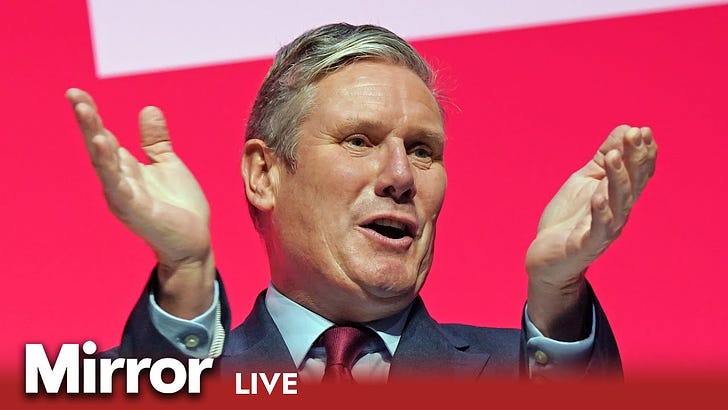CPTPP (again), Chinese firm invests in two British energy companies, potential investment opportunity
A Beijing to Britain briefing
Hello,
The conversation around Chinese electric vehicles arriving in the United Kingdom is multi-dimensional and presents a fascinating example of the age-old battle between economic prosperity and security. At its most simple, I’m picking up two counterarguments when I speak to different groups.
In the red corner, economic prosperity. Advocates argue that Chinese EVs are high quality, cheap for consumers (especially during a cost of living crisis), and allow the UK to move towards its stated green goals at a faster and more realistic rate. It’s not China’s fault the UK dismantled its auto industries in the past, they say, and throwing vague security accusations at Chinese EVs without backing them up with real evidence is not compelling. Concerns over Chinese EVs having ‘backdoors’ that could be used to spy would go against how any private company would want to function, they say - after all, who would ever buy again from a Chinese brand they felt was spying on them? It would not be in the Chinese EV’s interest to do this.
In the blue corner, economic security. Frequently citing China’s National Intelligence Law, which compels Chinese companies to hand over data secretly to the PRC Government when asked, this group holds the view that Chinese EVs represent a genuine concern on several levels. Additionally, these vehicles contain cellular (IoT) modules (CIMs), many of which are Chinese-made, and which in turn could allow EVs to “be immobilised remotely by officials in China”, per one industry leader. And more generally, Chinese EVs got their headstart thanks to unfair economic practices and market distortion, which will undermine and undercut British companies in the UK, causing job losses and loss of industry.
Over the coming years, we will watch this battle play out through Parliament and the papers. Ultimately, this may end up being another strategic decision that the British Government allows to be made for them abroad. While the conversation here has failed to attract proper political scrutiny and interrogation, America and the European Union are both moving forward at pace and coming to their own conclusions. Just this week, US Commerce Secretary Gina Raimondo raised concerns about the data collected by Chinese EVs in a chat alongside EU Commissioner Margrethe Vestager.
In this week’s briefing, we have a closer look at a Chinese company which has recently invested in two British energy companies, and ask what signals British politicians and investors should be reading in light of the US’s BIOSECURE Act.
Oh, and one more thing. The British Government quietly announced this week it was postponing the long-awaited UK-African Investment Summit (UK-AIS), due to take place in April. This was meant to be a significant summit and a chance for the UK to show interest and engagement with several influential African nations. Curiously, a similarly timed UK-EU Summit has failed to receive confirmation. One possible answer for these significant delays at a critical moment? A snap General Election in Spring…
- Sam Hogg, Editor
In this week’s briefing, we examine:
A Chinese company which has invested in two small British energy-related companies, not picked up in mainstream media
Where could investors look in the UK in light of the US’s BIOSECURE Act
Diplomacy Tracker
🇳🇿 Prime Minister Rishi Sunak spoke to New Zealand’s Prime Minister Christopher Luxon. The pair discussed “a wide range of international issues”, and that “it was important for 5 Eyes partners to continue to cooperate on addressing threats to global economic security and stability, including from China.“🇺🇸 Justice Secretary Alex Chalk visited the United States to dry and solidify support for Ukraine. The visit reflects a concern that the United States might withdraw meaningful support for Ukraine, which could see the conflict ending with a Russian victory and in turn changed calculations on areas such as Taiwan. Defence Secretary Grant Shapps echoed the same message on his visit to the region too.🇹🇱 Foreign Secretary David Cameron and Minister for the Indo-Pacific Anne-Marie Trevelyan welcomed Timor Leste José Ramos-Horta to London. They discussed “strengthening our bilateral partnership, the Indo-Pacific region, and the UK’s support” for Timor Leste’s CPTPP application. 🇯🇵 Labour’s Shadow Minister for Asia & the Pacific, Catherine West, visited Japan. 🇸🇬 Labour’s Shadow Foreign Secretary, David Lammy, invited Singapore’s new High Commissioner, Ng Teck Hean, into Parliament to discuss “green tech, Labour's commitment to the Indo-Pacific, and the vast potential of our strategic partnership.”🇰🇷 A team from the Department for Business and Trade visited South Korea to discuss semiconductors at SEMICON Korea.Politics
On a trip to the United States, Defence Secretary Grant Shapps again tried to reiterate the link between the war in Ukraine and a potential conflict in Taiwan. “Regimes who do not believe in democracy are watching”, he said, “Everyone is watching – the Iranians are looking. Do we just run out of puff, run out of patience and go away? China will be watching in the Indo-Pacific, North Korea will be watching. “It is vitally important to our own national interests, and definitely to the Western civilised world, that Ukraine is successful in their own country.” His comments come as the United Kingdom seeks to shore up American support for the Ukrainian war effort, explicitly and implicitly, ahead of a potential Trump premiership.
Back in Westminster, there were several short questions and debates to do with matters related to China in Parliament this week, especially since it was the Foreign Office’s turn to be dragged into the Commons to answer questions from MPs.
Chair of the all-party parliamentary group for the Philippines, Rob Roberts (independent MP, following being removed from the Conservatives for inappropriate behaviour to staff) asked the Foreign Office if it was “taking diplomatic steps to help reduce the risk of conflict in the West Philippine sea.” He cited videos circulating on social media showing “Chinese gunboats ramming and victimising Philippine fishermen in the West Philippine sea.” The DUP’s Jim Shannon added “China is quite clearly a thuggish country; a bully country that thinks it can step upon anybody. They have an insatiable demand and appetite for everybody else’s resources. When will the time come that China will understand that they cannot bully the wee person—that we will stand with that wee person against them?” In response, Minister for the Indo-Pacific, Anne-Marie Trevelyan, cited several recent examples of UK-Philippinnes bilateral action in this area. SNP and IPAC MP Stewart McDonald cited Rhodium Group research and Bloomberg number crunching to ask if the Government would publish its economic assessment of an invasion of Taiwan. Unsurprisingly, the Government did not commit to doing so.
A short stroll down the corridor, Peers debated the UK’s (lack of) industrial strategy. Brought forward by Labour, it opened with Lord (Tom) Watson asking why the UK was the only advanced economy without one. China’s apporach to the issue was mentioned in passing several times.
Elsewhere, the Council on Geostrategy held an event analysing the recent Taiwanese elections. It was the first time the new Taiwanese Representative, H. E. Vincent Chin-Hsiang Yao, had spoken at an event in Parliament. The session touched on several issues related to Taiwan’s future, including what the United Kingdom could do in the event of a crisis brought on by the Chinese Communist Party. Short write-up here. H.E Chin-Hsiang Yao spoke to Sky News about the island’s future, and used an earlier Daily Mail interview to discuss UK-Taiwan economic relations.
On the same evening, Security Minister Tom Tugendhat spoke at a Hong Kong-focused event in Westminster. Addressing an audience at the Welcoming Committee for Hong Kongers, Tugendhat slammed the newly released Article 23 and National Security Law, stating (translated from here) "The only thing that Article 23 and the National Security Law have achieved is to destroy what makes Hong Kong prosperous: freedom, opportunity and fair laws. We have already seen a significant drop in foreign investor confidence because of their actions, and I suspect we will see an even greater drop in confidence because of their autocratic governance." "We firmly oppose this UK politician's groundless attack on the legislation of Article 23 of the Basic Law of Hong Kong," a Chinese Embassy spokesman said in a statement. For some coverage of Article 23, which is currently out for consultation, read here.
Asked this week what assessment the Foreign Office had made of Hong Kong’s financial and economic autonomy, the minister responded “The Hong Kong SAR Government has maintained a free market economic and trade system, retaining autonomy in deciding their economic and trade policies. Hong Kong continues to be recognised as an international financial centre with sole discretion over its monetary and financial policies.” A similar question to the Treasury elicited the exact same response “Hong Kong continues to be recognised as an international financial centre with sole discretion over its monetary and financial policies.“



